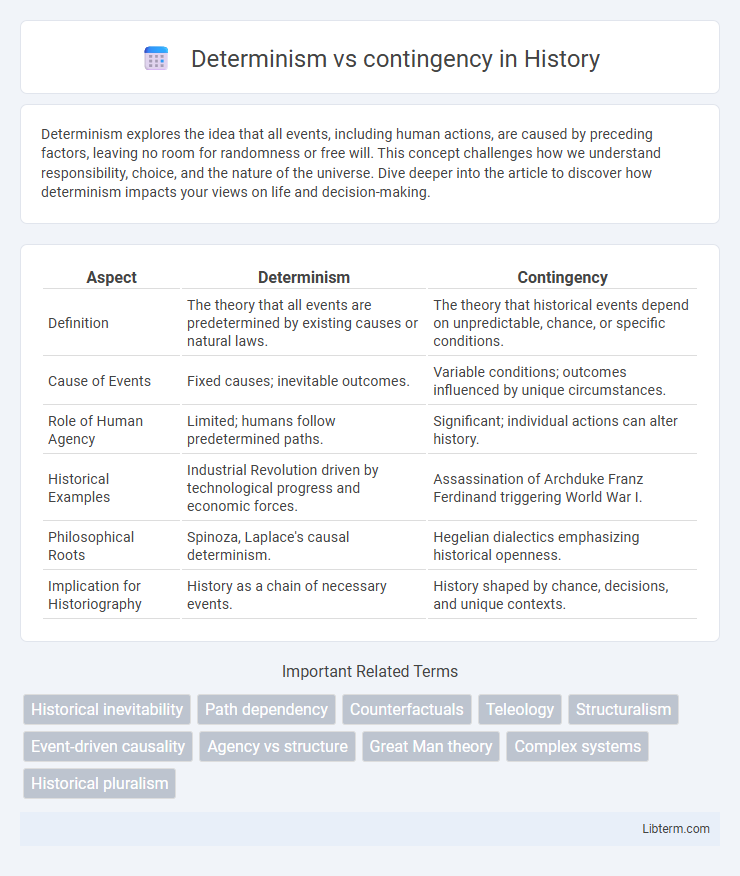Determinism explores the idea that all events, including human actions, are caused by preceding factors, leaving no room for randomness or free will. This concept challenges how we understand responsibility, choice, and the nature of the universe. Dive deeper into the article to discover how determinism impacts your views on life and decision-making.
Table of Comparison
| Aspect | Determinism | Contingency |
|---|---|---|
| Definition | The theory that all events are predetermined by existing causes or natural laws. | The theory that historical events depend on unpredictable, chance, or specific conditions. |
| Cause of Events | Fixed causes; inevitable outcomes. | Variable conditions; outcomes influenced by unique circumstances. |
| Role of Human Agency | Limited; humans follow predetermined paths. | Significant; individual actions can alter history. |
| Historical Examples | Industrial Revolution driven by technological progress and economic forces. | Assassination of Archduke Franz Ferdinand triggering World War I. |
| Philosophical Roots | Spinoza, Laplace's causal determinism. | Hegelian dialectics emphasizing historical openness. |
| Implication for Historiography | History as a chain of necessary events. | History shaped by chance, decisions, and unique contexts. |
Introduction to Determinism and Contingency
Determinism asserts that every event or decision is the inevitable result of preceding causes, emphasizing predictability and causality in natural and social phenomena. Contingency, in contrast, highlights the role of chance, uncertainty, and the potential for multiple outcomes in shaping events. Understanding the interplay between determinism and contingency is crucial for analyzing complex systems, decision-making processes, and historical developments.
Defining Determinism: Core Concepts
Determinism asserts that all events and actions are predetermined by prior causes, following fixed natural laws without random influence. Core concepts include causality, where every effect has a definitive cause, and inevitability, implying that given initial conditions, the outcome is predictable. This framework contrasts with contingency, which emphasizes unpredictability and the role of chance in shaping events.
Understanding Contingency in Theory
Contingency in theory emphasizes the importance of context-specific factors and situational variables that influence outcomes, challenging deterministic perspectives that predict uniform results. It highlights how organizational structures, environmental conditions, and human behavior interact unpredictably, leading to multiple possible scenarios. Effective decision-making requires recognizing these uncertainties and adapting strategies dynamically rather than relying solely on fixed causal relationships.
Historical Perspectives on Determinism
Historical perspectives on determinism emphasize the belief that all events, including human actions, are predetermined by prior causes, often rooted in classical physics and philosophical doctrines such as Stoicism and Enlightenment rationalism. Key figures like Laplace posited a mechanistic universe where future states can be predicted if the initial conditions are known, reflecting strict causal determinism. These views contrast with contingency, which highlights the role of chance, unpredictability, and the influence of unforeseen factors in shaping historical outcomes.
Philosophical Arguments for Contingency
Philosophical arguments for contingency emphasize the unpredictability and openness of events, asserting that not all phenomena are predetermined by prior states. Contingency highlights the possibility of multiple outcomes arising from the same initial conditions, challenging strict determinism. Thinkers like William James and Charles Sanders Peirce argue that indeterminacy allows for free will and genuine novelty in the universe.
Determinism vs Contingency in Scientific Thought
Determinism in scientific thought asserts that all events, including human actions and natural phenomena, follow precise causal laws, enabling predictions based on initial conditions. Contingency challenges this view by emphasizing the role of chance, unpredictability, and variable outcomes influenced by unique contexts or random factors in scientific processes. Debates between determinism and contingency shape methodologies in fields like physics, biology, and social sciences, influencing how scientists interpret causal relationships and model complex systems.
Real-World Examples of Determinism
Determinism is illustrated in classical mechanics, where Newton's laws predict planetary motion with precise accuracy, demonstrating predictable outcomes based on initial conditions. In genetics, determinism surfaces as DNA sequences dictate biological traits, making certain health predispositions highly predictable. Economic models also exhibit deterministic patterns when supply and demand laws reliably forecast market behaviors under stable conditions.
Practical Implications of Contingency
Contingency theory emphasizes that organizational success depends on the alignment of management practices with specific situational variables such as environment, technology, and workforce characteristics. Practical implications include the need for flexible leadership styles and adaptive decision-making processes that respond dynamically to changing conditions rather than relying on fixed, deterministic models. This approach enhances resilience and performance by tailoring strategies to the unique context of each organizational challenge.
Determinism and Contingency in Modern Debates
Determinism in modern debates emphasizes the predictable causality of events based on prior states, often linked to scientific paradigms and deterministic models in physics and philosophy. Contingency highlights the role of chance, unpredictability, and context-specific factors, challenging deterministic frameworks by underscoring the influence of random or unforeseen events. Contemporary discourse balances these perspectives by examining how fixed laws interact with probabilistic elements, particularly in fields like quantum mechanics, evolutionary biology, and social theory.
Conclusion: Bridging Determinism and Contingency
Bridging determinism and contingency involves recognizing that while deterministic factors provide a structured framework of cause and effect, contingency introduces the role of unpredictable variables shaping outcomes. Integrating both perspectives fosters a comprehensive understanding of complex systems, emphasizing that predetermined paths coexist with flexible, context-dependent events. This synthesis enhances decision-making models by balancing systematic predictability and adaptive responsiveness to unforeseen circumstances.
Determinism Infographic

 libterm.com
libterm.com